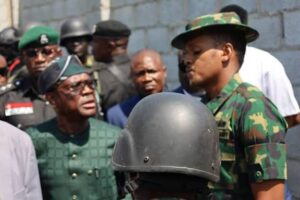By Headlinenews.news Staff Reporter
Abuja, Nigeria – November 11, 2025
A tense confrontation erupted today in Abuja between the Minister of the Federal Capital Territory (FCT), Nyesom Wike, and armed soldiers guarding a disputed property allegedly linked to a former service chief. The heated exchange, captured on video, has ignited national debate over military influence in civil administration and the rule of law within Nigeria’s capital territory.

Confrontation at Gaduwa
The altercation occurred at Plot 1946, Gaduwa District, during an unscheduled inspection by the FCT Administration team led by Minister Wike.
Eyewitnesses and footage circulating on social media show Wike confronting a group of soldiers who had barred his convoy and FCTA officials from entering the premises.

The soldiers reportedly claimed they were acting on “lawful orders” and insisted the land was legitimately acquired by their principals. Wike, visibly angered, countered that the site lacked any valid allocation document or building approval, accusing the military of facilitating unlawful land occupation.
> “This is the Federal Capital Territory, not a military cantonment,” Wike was heard saying. “No one is above the law — not even former service chiefs.”

Underlying Dispute
According to multiple reports from ThisDay, TVC News, and Sahara Reporters, the property in question is linked to a company reportedly associated with a retired Chief of Naval Staff.
The FCTA has been investigating several high-value land parcels allegedly acquired irregularly by former military officers or their proxies.
At the heart of the confrontation lies a recurring question: who controls Abuja’s prime land — the civilian authority or entrenched security interests?

Silence from Authorities
As of press time, neither the Nigerian Army nor the FCT Administration has issued an official statement clarifying the incident.
Defence Headquarters has remained silent on whether the soldiers involved acted under official directive or on private orders.
Similarly, the FCTA’s land registry has yet to release public documentation proving or disproving ownership claims over the disputed plot.
A heated confrontation broke out in Abuja between FCT Minister Nyesom Wike and soldiers guarding a disputed property allegedly linked to a former service chief. The clash at Plot 1946, Gaduwa District, occurred when soldiers blocked Wike’s convoy, claiming lawful orders. Wike accused them of aiding illegal land grabbing and declared that “no one is above the law.” Reports from multiple outlets say the land lacks valid allocation and building approval, yet is tied to ex-military interests. Neither the Nigerian Army nor the FCTA has issued an official statement. The incident underscores growing tension between civil authority and military privilege in Abuja. Observers warn it sets a dangerous precedent if retired officers can use armed personnel to defy lawful government oversight in the Federal Capital Territory.
Full report on www.headlinenews.news

Implications for Governance
The incident has triggered widespread public concern about military interference in civil land administration.
Analysts warn that allowing serving or retired officers to obstruct government enforcement sets a dangerous precedent.
Legal experts note that, under the FCT Act, all land within the territory belongs to the federal government, held in trust by the Minister. Any competing claim must be resolved through lawful channels, not through physical force or intimidation.

> “When soldiers challenge a sitting minister on civil land matters, it sends the wrong message about accountability and civil supremacy,” said a policy analyst in Abuja.
A Test of Authority
For Minister Wike, known for his combative stance against encroachment and corruption, the clash underscores the larger battle to reassert civilian control over Abuja’s land administration.
Observers say his willingness to confront entrenched interests — including former service chiefs — could either strengthen public confidence in government authority or deepen institutional friction between civilian and military establishments.
Editorial Perspective
While emotions around the incident are high, one fact stands clear: no individual, no matter how powerful, should stand above the law in the Federal Capital Territory.
If verified, any attempt by retired or serving officers to shield private holdings with state military force undermines Nigeria’s democratic order.
This altercation should serve as a wake-up call — to reaffirm that Abuja belongs to the Nigerian people, governed by law, not might.
Headlinenews.news Special Investigative Report




